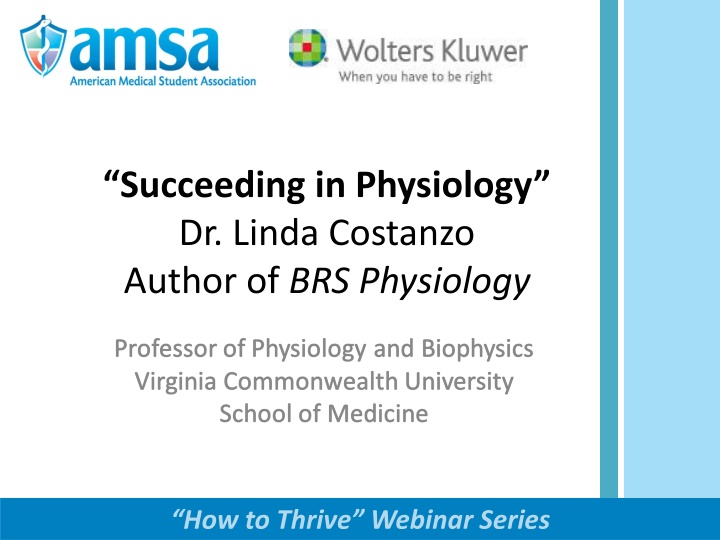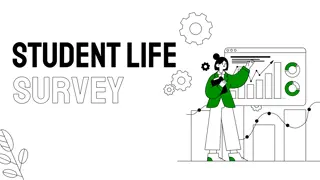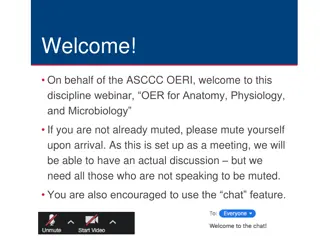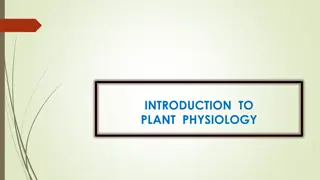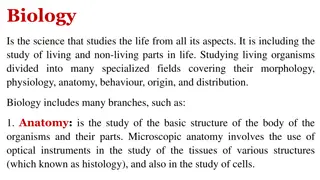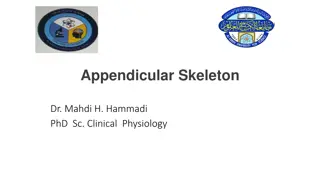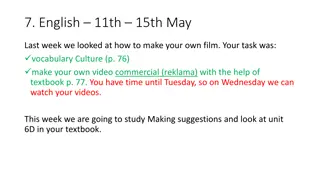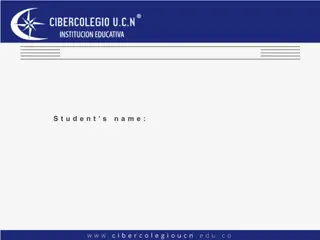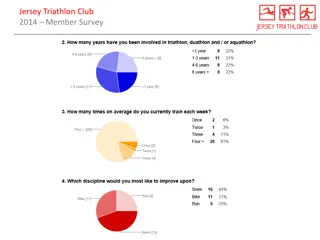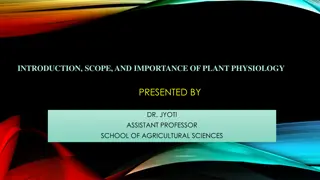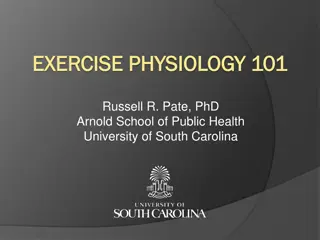Mastering Physiology: Key Practices and Book Suggestions
Importance of physiology in medicine and how to excel in the subject. Learn about effective study methods, book recommendations, and the significance of understanding concepts over rote memorization. Discover the philosophy behind learning physiology for life and the benefits of pre-reading, attending classes, reviewing, and practicing questions. Uncover the difference in reference, didactic, and review books and their roles in enhancing your understanding. Dive into case books and dilemma involving writing in physiology studies.
Download Presentation

Please find below an Image/Link to download the presentation.
The content on the website is provided AS IS for your information and personal use only. It may not be sold, licensed, or shared on other websites without obtaining consent from the author.If you encounter any issues during the download, it is possible that the publisher has removed the file from their server.
You are allowed to download the files provided on this website for personal or commercial use, subject to the condition that they are used lawfully. All files are the property of their respective owners.
The content on the website is provided AS IS for your information and personal use only. It may not be sold, licensed, or shared on other websites without obtaining consent from the author.
E N D
Presentation Transcript
Succeeding in Physiology Dr. Linda Costanzo Author of BRS Physiology
WELCOME AND INTRODUCTION www.amsa.org
Why is Physiology Different? The stakes feel higher. Physiology is the basis for medicine. Physiology cannot be memorized (and you ve become good memorizers). Graphs, equations, and calculations (gotta love em!). www.amsa.org
Learning Physiology The Philosophy Learn for life (physiology undergirds all of pathophysiology and medicine) Concepts and principles >> isolated facts Hierarchy of concepts, connections, recurring themes www.amsa.org
Learning Physiology Best Practices The cycle: 1. Pre-read = warm the circuits Books or lecture notes 2. Attend class Having pre-read, class time is learning time 3. Review 4. Practice questions Repeat! www.amsa.org
Books or Not? Books tell same story, in different voice. See hierarchy Provide cohesion Fill gaps Spot help for difficult topics www.amsa.org
Reference book, didactic book, or review book? Reference physiology books Medical Physiology (Boron & Boulpaep) Physiology (Berne and Levy) Didactic physiology book Physiology (Costanzo) Medical Physiology (Rhoades) www.amsa.org
Reference book, didactic book, or review book? (cont d) Review books BRS Physiology (Costanzo) LIR Physiology First Aid for USMLE Step 1 Step-Up to USMLE Step 1 www.amsa.org
Case Books Physiology Cases and Problems (Costanzo) First Aid Cases for the USMLE Step 1 www.amsa.org
To write or not to write? That is your dilemma www.amsa.org
What NOT to write (when studying physiology) Do NOT copy the notes Habit from undergrad days (fear of letting go of strategy that seemed to work) Passive, Mindless Eats up time (that could be used for learning, understanding, repetition, and doing practice questions) Kick the habit now But I need to write in order to learn! www.amsa.org
What can I write that is useful and active? Yes! Make your writing evolve active Don t write until you know something about the topic Depends on topic (for this topic, what would be most useful?) Create a visual (list, comparisons, charts, sequence of events) Synthesis E.g., sheet with all major points about fetal lung E.g., sheet with all major points about adrenal cortical hormones Drill Write a sequence from memory Practice redrawing graphs Write equations from memory Practice problems www.amsa.org
Practice Questions! The antidote to that graph, equation, calculation issue Lots--Early and Often Questions are learning tools (don t wait until you re ready ) Learn from the right and wrong answers Test understanding, build confidence, practice test- taking strategies Sources: Self-assessments in your course BRS Physiology (end-of-chapter) Pre-test Physiology www.amsa.org
Good test-taking in physiology Read the stem carefully and underline critical words. #1 test-taking problem in physiology is not answering the question asked. Clearly identify the topic of the question and find that topic in your brain. Cover the answers while working the question. Work slowly enough to think through steps correctly. Write main thinking steps in the margin. Protects against changing increases to decreases in your mind. Match your thinking with the answer choices and select the best answer. www.amsa.org
Good test-taking, contd First shot, best shot Once slowly >> twice fast Don t be distracted by distractors Don t overthink Directions say single best answer stop there! Don t change answers impulsively. If you re going to change, work the question again from scratch. Sleep (the night before). www.amsa.org
Thank you for joining AMSA, Lippincott, & Dr. Costanzo this evening! Dr. Costanzo s email address: lcostanz@vcu.edu Webinar sponsored by LEARN (The Lippincott/AMSA reviewer network) www.amsa.org
